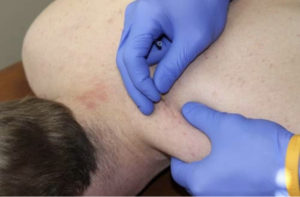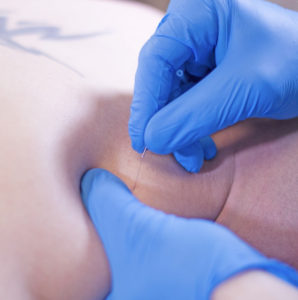Original article https://pubmed.ncbi.nlm.nih.gov/28163732/
The effect of dry needling on the radiating pain in subjects with discogenic low-back pain: A randomized control trial
- PMID: 28163732
- PMCID: PMC5244646
- DOI: 10.4103/1735-1995.192502
Free PMC article
Abstract
Background: Disk herniation is the most common cause of radiating low back pain (LBP) in subjects under 60 years of age. The present study aims to compare the effect of dry needling (DN) and a standard conservative approach on the pain and function in subjects with discogenic radiating LBP.
Materials and methods: Fifty-eight subjects with discogenic radicular LBP were screened and randomized into control (Standard physical therapy, n = 29) and experimental group (Standard physical therapy and DN, n = 29). Radiating pain intensity and disability were measured using visual analog scale (VAS) and Oswestry Disability indices at baseline, at the end of treatment and 2 months after the last intervention session. The changes in pain intensity and disability were studied using a 3 × 2 repeated measures analysis of variance considering time as the within-subject factor and group as the between-subject.
Results: Pain intensity and disability scores decreased significantly in both experimental and control groups (experimental group: VAS = 37.24, Oswestry Disability Index [ODI] =28.48, control group: VAS = 45.5, ODI = 32.96), following the intervention. The change continued during the follow-up period (P < 0.001 for all comparisons). Pain and disability improvement, however, were more significant in experimental group, both in post intervention (experimental group: VAS = 25.17, ODI = 22.17, control group: VAS = 42.4, ODI = 30.27) (P = 0.05 and P = 0.03, respectively) and follow-up measures (P = 0.006 and P = 0.002, respectively).
Conclusion: Both intervention strategies seem to significantly improve pain and disability immediately following intervention, where the improvement continued during 2 months after the last active intervention. Therefore, supplementary DN application may enhance the effect of the standard intervention considerably.
What does this mean to you?
CORE Omaha Physical Therapy explains…
Dr. Mark Rathjen PT DPT CSCS
CORE Physical Therapy and Sports Performance PC.
The above results include the line ” Pain and disability improvement, however, were more significant in experimental group, both in post intervention (experimental group: VAS = 25.17, ODI = 22.17, control group: VAS = 42.4, ODI = 30.27) (P = 0.05 and P = 0.03, respectively) and follow-up measures (P = 0.006 and P = 0.002, respectively).”
This means that although traditional conservative treatment was effective, it was more effective for back pain in patients who also used dry needling during the rehabilitation plan of care. Patient number (n) for this study is 29 per experiment and control group. These subjects presented with disc related pain, age and specific information on patient history were not given in the abstract.
Dry needling is seldom performed in isolation. When combined with physical therapy interventions more conservative and traditional in nature, we see dry needling in this case was quite effective in increase outcomes in a timely manor. Overall, for many years, we have integrated trigger point dry needling in our rehabilitation protocols. We have successfully supplemented dry needling as a fantastic adjunct to increase recovery efficiency. This includes all patient types. This includes all muscular conditions. This includes all performance levels. This includes most chronic conditions.
In our own internal data and metrics. We saw patient visit decrease by 12-24 % in subsequent equivalent rehabilitation data. this is significant. A 25% decrease in visits per episode of care will reduce rehab from 4 weeks to 3, etc. More efficient recovery also results in decrease cost to the patient.
C.O.R.E. Physical Therapy and Sports Performance PC,
17660 Wright St, Suites 9/10
Omaha, NE 68130
402-930-4027
At CORE Physical Therapy in Omaha, We specialize in the treatment of athletes. We have worked with athletes for a combined 30 years.
This is who are, This is what we do.
Owned and Operated
by
Dr. Mark Rathjen and Dr. Claire Rathjen.
CORE is a family owned business
est. 2015
We are proud to serve the greater Omaha metro area.
For More information, Please feel free to contact us https://coreomaha.com/contact/
Please feel free to follow us at https://www.facebook.com/COREomaha/
To get started https://coreomaha.com/getting-started/
For more Blog information https://coreomaha.com/blog/
Youtube Account linked below.
https://www.youtube.com/channel/UCVg8OSN5h-i1n_ykw1Gvahg?view_as=subscriber



